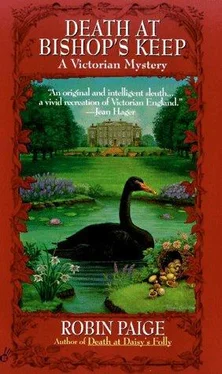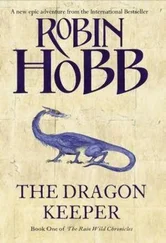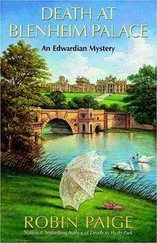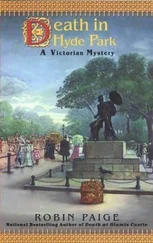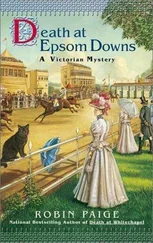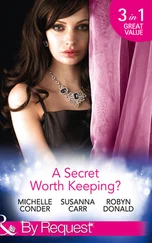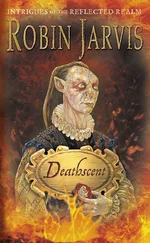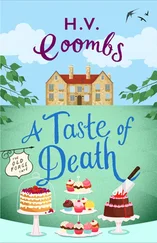Robin Paige - Death at Bishops Keep
Здесь есть возможность читать онлайн «Robin Paige - Death at Bishops Keep» весь текст электронной книги совершенно бесплатно (целиком полную версию без сокращений). В некоторых случаях можно слушать аудио, скачать через торрент в формате fb2 и присутствует краткое содержание. Жанр: Классический детектив, на английском языке. Описание произведения, (предисловие) а так же отзывы посетителей доступны на портале библиотеки ЛибКат.
- Название:Death at Bishops Keep
- Автор:
- Жанр:
- Год:неизвестен
- ISBN:нет данных
- Рейтинг книги:5 / 5. Голосов: 1
-
Избранное:Добавить в избранное
- Отзывы:
-
Ваша оценка:
- 100
- 1
- 2
- 3
- 4
- 5
Death at Bishops Keep: краткое содержание, описание и аннотация
Предлагаем к чтению аннотацию, описание, краткое содержание или предисловие (зависит от того, что написал сам автор книги «Death at Bishops Keep»). Если вы не нашли необходимую информацию о книге — напишите в комментариях, мы постараемся отыскать её.
Death at Bishops Keep — читать онлайн бесплатно полную книгу (весь текст) целиком
Ниже представлен текст книги, разбитый по страницам. Система сохранения места последней прочитанной страницы, позволяет с удобством читать онлайн бесплатно книгу «Death at Bishops Keep», без необходимости каждый раз заново искать на чём Вы остановились. Поставьте закладку, и сможете в любой момент перейти на страницу, на которой закончили чтение.
Интервал:
Закладка:
Kate shivered.
11
"Manners make the man, tut manors make me nobleman."
— Punck,Jan.27, 1894Somewhat to his surprise, Charles was enjoying his visit to the Marsdens' country manor. His intellect was entertained by Bradford's dry wit; his curiosity was piqued by the dig at nearby Colchester, and especially by the morning's discovery; and his throat was soothed by the clean air of the country, a welcome change from the irritating London fog, which was tar-flavored and thick as treacle. As well, he loved the Essex countryside, for as a lad he had spent summers with his mother's family at East Bergholt, only three miles away across the River Stour. It was there he had taken to photography, capturing on photographic plate the same landscapes that his famous great-uncle, John Constable, had earlier captured on canvas.
But evenings at Marsden Manor, Charles felt, were less to be enjoyed than endured. On this particular night, he itched to get to the temporary photographic laboratory he had installed in the scullery, which he had equipped with a Carbutt's Dry Plate Kerosene Lantern that allowed him to develop photographs in the absence of gas or electric light. But he was prevented from satisfying his wish by the requirement to dress for dinner, to which, Lady Henrietta had informed him, guests were invited.
Dressing was not Charles's favorite activity, and he did not
particularly enjoy social dinners with persons he did not know. For Charles, the social ritual of dining was rather a burden, requiring that he exert himself to be pleasant when he would have much preferred a cold bird and a glass of wine with Bradford, followed by a game of chess and an article in his latest scientific journal.
But tonight's dinner promised to be of some little interest, for the guests included Barfield Talbot, the village vicar, and the Marsdens' nearest neighbors, Miss Sabrina Ardleigh, Mrs. Bernice Jaggers, and their newly arrived niece, Kathryn Ardleigh. So it was that Charles found himself, sherry in hand, seated on a chair in the drawing room, across from a sofa on which sat Miss Ardleigh, whose simple blue dress severely (but pleasantly, Charles thought) contrasted with the elaborate gowns of Eleanor and her younger sister, Patsy.
"Imagine my surprise and pleasure," Eleanor told Charles excitedly, "when I learned that dear Kathryn and her aunts would be at dinner tonight."
"And mine," the vicar put in. He was a stooped, wiry man in his late sixties, with a lion's mane of silver hair and a droopy white mustache. His smile at Miss Ardleigh lighted pale blue eyes. "Your aunt has told me how glad she is that you were able to come to England. She has for some time felt the need to be closer to her only niece."
Miss Ardleigh met the vicar's smile with an inquiring look. Charles thought she was about to ask a question, but after a brief hesitation, she only said, "I am glad to be here."
The vicar turned to Charles. "And I am delighted to meet you, Sir Charles. I understand that you are assisting Fairfax with the Colchester dig. I must confess to being something of an antiquarian myself. The Colchester site has long held a great fascination for me."
Eleanor's eyes were sparkling. "Then you may be interested to hear, Vicar, of Sir Charles's latest find." Her voice took on a tone of muted excitement. ' 'He discovered a dead man in the dig this morning!"
There was a horrified gasp from Miss Ardleigh's two aunts, seated across the room with Lady Henrietta. "Eleanor!" Lady Henrietta exclaimed.
"But it's true, Mother," Eleanor protested. "He'd been murdered!"
"How perfectly appalling!" Patsy Marsden cried in a coquettish fright, clapping her hands.
"Indeed it is appalling," Lady Henrietta said sternly. "Not at all a fit subject. Shall we speak of something else?"
"Murdered, was he, Charles?" Lord Marsden asked from his chair beside the columned and pedimented mantelpiece. The baron was a balding gentleman of immaculate white waistcoat and imposing stomach, testimony to a long-standing devotion to saddle of Dartmoor mutton and excellent port.
"You're in for it now, Charles," Bradford said, helping himself to the sherry decanter on the sideboard. "You'll have to tell the whole thing."
Charles looked at Lady Henrietta.
"Oh, very well," she said. But Charles could hear, beneath the grudging reluctance of her tone, an unacknowledged curiosity, so he gave an abridged and slightly sanitized account of the discovery of the dead man and the activities of the police. His attention, however, was focused less on the story than on Miss Ardleigh, whose interest in the narrative was intense, but nothing like the self-dramatized horror exhibited by Eleanor and Patsy.
"A foreign gentleman, you say?" the vicar asked, knitting bushy white brows.
"Continental," Charles replied, "from the cut of the clothes. He was wearing a scarab ring that suggested travel in Egypt, or at the least, Egyptian interests."
"A scarab?" Miss Ardleigh asked quickly. Her glance went to her aunts. The elder aunt, who sat on the sofa with an easy grace that was very different from the frowning abruptness of her sister, colored slightly and turned her head.
"What is a scarab?" Patsy asked.
"A dung beetle," Bradford said. His mother made a noise in her throat.
"An Egyptian magical amulet," the vicar said quickly.
"The beetle is associated with the transit of the sun," Charles explained, "and hence the resurrection."
The fussy aunt sniffed. "Egyptian magic," she said in a
tone that suggested hellfire and perdition. "No wonder he was murdered."
The vicar shifted uncomfortably and cleared his throat. "My dear Mrs. Jaggers," he began, but was interrupted by Lord Marsden.
"Robbery, to be sure," the baron said gruffly. "Country's gone to the dogs. Nobody's safe since we've ceased giving riffraff the boat. Damned anarchists can plant their bombs anywhere, blast it all. That Frenchie who blew himself up at Greenwich, for instance. If the bloody bomb hadn't gone off in his hands, it would've taken out the Royal Observat'ry." He scowled at his elder daughter. "That's why women must not go about unescorted, Eleanor. Never know when you might be blown up."
"Yes, Papa," Eleanor said, meekness itself. She cast her glance sideways at Charles. "Sir Charles has photographs of the dead man," she added with a certain coyness.
Lady Henrietta pulled herself up. ' 'I simply do not understand,' ' she remarked acidly, ' 'the current attraction of crime, particularly murder, among younger people." She gave Eleanor and Patsy a severe look down the length of her rather horsey nose. ' 'No lady concerns herself with such vulgar matters." She turned the same severity upon Charles, but indulgently relaxed, as if to say that his transgression, for transgression it was, was understood and forgiven. Men were expected to interest themselves in vulgar matters, while women were expected not to notice.
Charles bowed. "Your pardon, Lady Henrietta. I do agree. Murder is hardly a drawing room matter."
Lord Marsden cleared his throat. "Bought another mare from Peel today," he announced to no one in particular. "Aim to breed her to Farleydale."
A look that might have been of misgiving crossed Bradford's face. "From Peel?" he asked. In a low voice, he added, "With respect, sir, I thought we had agreed not to-"
The baron's thick neck reddened fiercely. "A beauty, my boy. Excellent bloodline. High spirits. Grand bargain."
Bradford subsided, although Charles thought his friend looked uneasy, and he wondered again what was troubling
him. From horses, the baron's passion, the subject turned to hunting, and from hunting to balls, and from balls, inevitably, to weddings-specifically, to the wedding of Eleanor to Mr. Ernest Fairley, which would take place in three months' time. Precisely at nine, dinner was announced, and the company removed to the large dining hall.
Читать дальшеИнтервал:
Закладка:
Похожие книги на «Death at Bishops Keep»
Представляем Вашему вниманию похожие книги на «Death at Bishops Keep» списком для выбора. Мы отобрали схожую по названию и смыслу литературу в надежде предоставить читателям больше вариантов отыскать новые, интересные, ещё непрочитанные произведения.
Обсуждение, отзывы о книге «Death at Bishops Keep» и просто собственные мнения читателей. Оставьте ваши комментарии, напишите, что Вы думаете о произведении, его смысле или главных героях. Укажите что конкретно понравилось, а что нет, и почему Вы так считаете.
